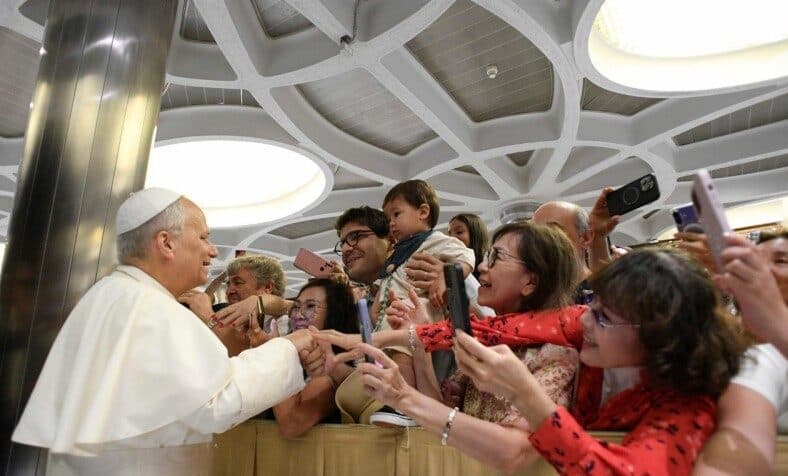During his General Audience, Pope Leo XIV spoke about the importance of forgiveness in the lives of people, looking at the story of Judas Iscariot’s betrayal of Jesus.
“How many relationships are broken, how many stories become complicated, how many unspoken words remain suspended,” the pontiff said in the Paul VI Audience Hall in the Vatican on Aug. 20.
“And yet the Gospel shows us that there is always a way to continue to love, even when everything seems irredeemably compromised. To forgive does not mean to deny evil, but to prevent it from generating further evil. It is not to say that nothing has happened, but to do everything possible to ensure that resentment does not determine the future,” Leo said.
He was referring to the scene in the Last Supper, when Jesus offers a morsel to the one who is about to betray him, who is Judas.
“Saint John, with his profound spiritual sensibility, tells us about this moment as follows: During supper, when ‘the devil had already induced Judas, son of Simon the Iscariot, to hand him over… Jesus knew that his hour had come to pass … he loved them to the end’ [Jn 13:1-2]. To love until the end: Here is the key to understanding Christ’s heart. A love that does not cease in the face of rejection, disappointment, even ingratitude,” the pope said.
“Jesus knows the time, but he does not submit to it: he chooses it. It is he who recognizes the moment in which his love must pass through the most painful wound, that of betrayal. And instead of withdrawing, accusing, defending himself… he continues to love: He washes the feet, dips the bread and offers it,” he continued.
Leo says Jesus offering to dip the bread is a “simple and humble gesture” that carries Christ’s love forward and to its depths, “not because he is ignoring what is happening, but precisely because he sees it clearly.”
“He has understood that the freedom of the other, even when it is lost in evil, can still be reached by the light of a meek gesture, because he knows that true forgiveness does not await repentance, but offers itself first, as a free gift, even before it is accepted,” the pope explained.
“Judas, unfortunately, does not understand. After the morsel – says the Gospel – ‘Satan entered him’. This passage strikes us: As if evil, hidden until then, manifested itself after love showed its most defenseless face. And precisely for this reason, brothers and sisters, that morsel is our salvation: Because it tells us that God does everything – absolutely everything – to reach us, even in the hour when we reject him,” he continued.
Leo said Jesus shows forgiveness is not forgetfulness, nor is it is weakness.
“It is the ability to set the other free, while loving him to the end. Jesus’s love does not deny the truth of pain, but it does not allow evil to have the last word. This is the mystery Jesus accomplishes for us, in which we too, at times, are called to participate,” he said.
The pontiff said people today experience painful and difficult nights.
“Nights of the soul, nights of disappointment, nights in which someone has hurt or betrayed us. In those moments, the temptation is to close ourselves up, to protect ourselves, to return the blow,” he said.
“But the Lord shows us the hope that another way always exists. He teaches us that one can offer a morsel even to someone who turns their back on us. That one can respond with the silence of trust. And that we can move forward with dignity, without renouncing love,” Leo continued.
“Let us ask today for the grace to be able to forgive, even when we do not feel understood, even when we feel abandoned. Because it is precisely in those hours that love can reach its pinnacle. As Jesus teaches us, to love means to leave the other free — even to betray — without ever ceasing to believe that even that freedom, wounded and lost, can be snatched from the deception of darkness and returned to the light of goodness,” the pope said.
“When the light of forgiveness succeeds in filtering through the deepest crevices of the heart, we understand that it is never futile. Even if the other does not accept it, even if it seems to be in vain, forgiveness frees those who give it: It dispels resentment, it restores peace, it returns us to ourselves,” he said.
Leo said Jesus, with the simple gesture of offering bread, “shows that every betrayal can become an opportunity for salvation, if it is chosen as a space for a greater love.”
“It does not give in to evil, but conquers it with good, preventing it from extinguishing what is truest in us: the capacity to love,” the pope said.
Follow Charles Collins on X: @CharlesinRome














